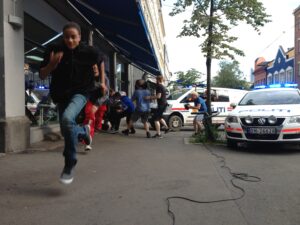Table of content
- What is a Stunt Coordinator?
- The Responsibilities of a Coordinator
- Key skills of an effective Coordinator
- Evolving Stunt Coordination in Cinema
- Challenges Faced by Stunt Coordinators
- Stunt Coordination and Technology
- Famous Stunt Coordinators through Film History
- How to Become a Stunt Coordinator
- Conclusion
Introduction
Stunts and action sequences are usually the highlight of an action movie. They get the audience to the edge of their seat, but there is more behind the scenes – that is, a highly capable visual organizer and director, i.e., stunt coordinator. The unsung heroes of film action, are the professionals who combine creativity, technical expertise, and unflinching commitment to safety, the stunt team.
In this article, we’ll explore the fascinating role of a stunt coordinator, their amazing contributions to the entertainment industry, and how they ensure that every action-packed moment leaves a lasting impression.
What is a Stunt Coordinator?
A coordinator is a professional expert who designs stunts and action sequences and oversees the working process of such sequences for films, TV shows, or live performances. They act as the bridge between the director’s imagination and technical and physical requirements required to execute stunt work in action sequences. The coordinators ensure that through the incorporation of choreography, engineering, and safety procedures, each stunt performed is done as imagined and meeting the creative vision of the director with all safety precautions.
The Responsibilities of a Stunt Coordinator
A stunt coordinator must collaborate in a smooth working relationship with the writers and the directors. They need to understand the story and determine how their stunts can add to the story and the action scenes. They coordinate sequences that are not only thrilling but also well-integrated into the story and pace of the film.

Ensuring Safety on Set
Safety, of course, is always a priority of any coordinator. Risk is assessed. All safety precautions necessary are executed with proper use of gear like harnesses, padding, and crash mats. It’s also the responsibility of stunt coordinators to advise against the performance of stunts likely to injure, actors, stunt personnel or the crew.
Managing the Stunt Team
A Coordinator is in charge of a team of stunt performers. He ensures they are trained well and prepared for the performance of the specific scene. He will arrange rehearsals and manage on-set changes where necessary.

Key skills of an effective Coordinator
Physical Expertise
A solid background in physical skills and activity, i.e., a martial art, gymnastics, precision driving, etc. Most stunt coordinators start out doing stunts, and it’s good advice to be on “the ground” and experience the action on your own body before transitioning into the coordinator area.
Creative Problem-Solving
Every stunt presents problems that range from environmental constraints to narrative requirements. A competent stunt coordinator should possess the capability to devise an out-of-the-box solution. One of the most essential skills of coordination is creativity. Nobody wants precise carbon copies of previous action scenes from other movies.
Communication and Leadership
A professional coordinator must be able to communicate their ideas and what they want in order to make the directors, actors, and their stunt teams all be on the same page with their coordinator and all be agreeing. Having good leadership skills will certainly help to keep everything managed and running smoothly on set.
Evolving Stunt Coordination in Cinema
Early Days of Stunts
In the era of silent films, stunts were more dangerous and almost devoid of any professional methodology such as safety and precautions, thats why many stunt people died or got badly injured during that era. Famous performers such as Buster Keaton and Harold Lloyd were well known for their daredevil stunts, which paved the way for today’s stunt performers.
Modern Innovations in Stunt Work
Stunt coordination nowadays incorporates sophisticated techniques and technologies. From wirework to digital enhancement, coordinators utilize the newest technology at their disposal in order to deliver astounding results while lessening the dangers.
Challenges Faced by Stunt Coordinators
Balancing Risk and Realism
The greatest challenge for a coordinator is to find a delicate balance between enhancing realistic, jaw-dropping stunts and the safety of the people involved.
Adaption with Changing Technology
With CGI technology becoming increasingly common, the coordinators must now change their approach to combine practical effects with digital augmentation in a seamless manner.
Stunt Coordination and Technology
Use of CGI and Practical Effects
Although the practical stunts are still used by most productions, a majority of dangerous scenes are supported by CGI to mask or create a blend of real and computer-generated scenes transitioning into each other without revealing the cgi work too obviously.
Advancements in Safety Equipment
From state of the art harness systems to fire-retardant suits, safety gear today enables stunt coordinators to push the envelope of what is possible while keeping the actors very safe.
Famous Stunt Coordinators through Film History
From Yakima Canutt to Hal Needham and Vic Armstrong, the coordinators have left their marks on movie history. Every innovation established new benchmarks of action sequences in movies and encouraged new filmmakers to do better.
How to Become a Stunt Coordinator
Training and Certifications
Most coordinators start off with specialized training in martial arts, gymnastics, or high-speed driving. Safety protocol and rigging certifications also come in handy. The more skills you can learn the better and the more prepared a stunt coordinator will be to correct future action sequences.
Building a Portfolio
Most stunt coordinators start out as stunt performers, building a portfolio of work showing ability and creativity.
Networking in the Industry
The more contacts you are able to make, the better it can translate into future jobs. It is always a good idea to network with directors, producers, and other stunt artists in this highly competitive field.
Conclusion
The stunt coordinator is a crucial element of filmmaking, infusing the possible unforgettable action scenes on screen with both creativity, ability, and leadership. Every day, technology improves, and while audiences ask for more and more, the efforts of modern day coordinators always set the bar higher on what is achievable through cinematic storytelling.
Whether director, action enthusiast, or an inquiring mind to discover the magic that is behind the curtain, an understanding of the art and craft of stunt coordination it allows for a deeper appreciation of the heart-stopping spectacles that define today’s entertainment.
